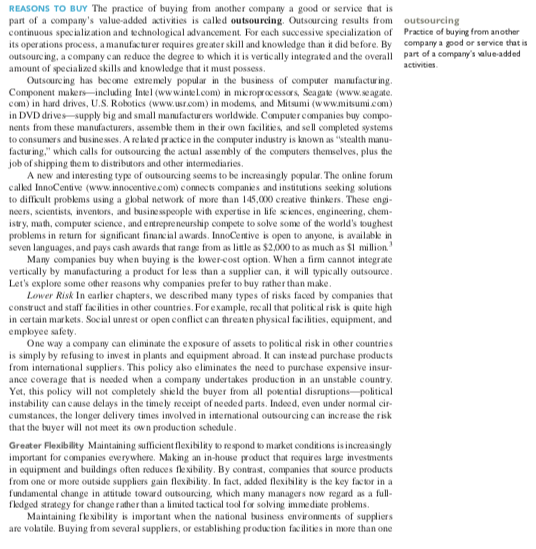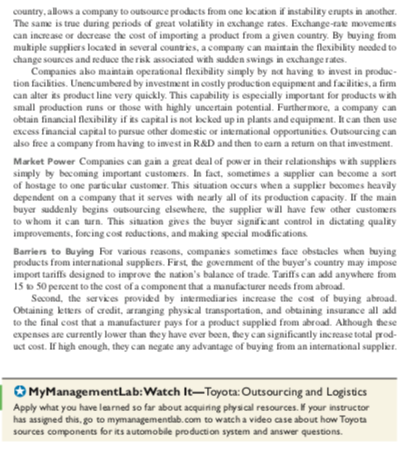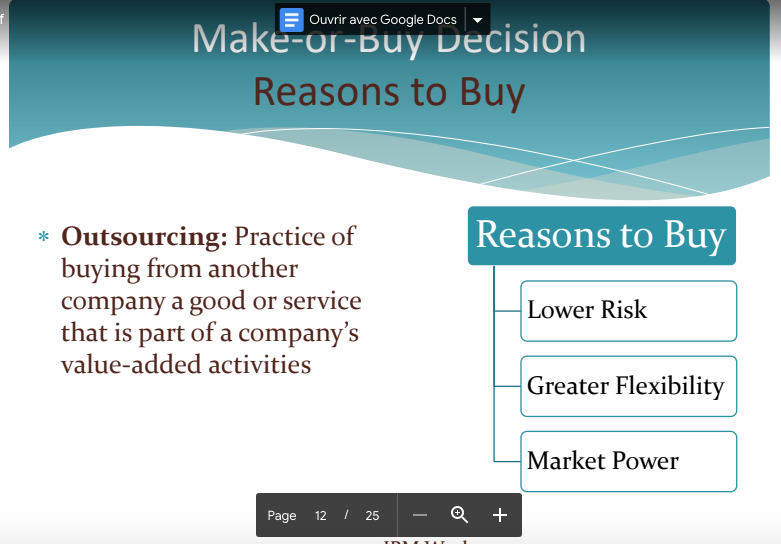a brief power point about the topic : Outsourcing (international operations)
REASONS TO BUY The practice of buying from another company a good or service that is part of a company's value-added activities is called outsourcing. Outsourcing results from outsourcing continuous specialization and technological advancement. For each successive specialization of Practice of buying from another its operations process, a manufacturer requires greater skill and knowledge than it did before. By company a good or service that is outsourcing, a company can reduce the degree to which it is vertically integrated and the overall part of a company'svalue added amount of specialized skills and knowledge that it must possess. activities Outsourcing has become extremely popular in the business of computer manufacturing. Component makers-including Intel (wwwintel.com) in microprocessors, Seagate (www.seagate. com) in hard drives, U.S. Robotics (www.ur.com) in modems, and Mitsumi (www.mitsumi.com) in DVD drives supply big and small manufacturers worldwide. Computer companies buy compo- nents from these manufacturers, assemble them in their own facilities, and sell completed systems to consumers and businesses, A related practice in the computer industry is known as "stealth manu- facturing," which calls for outsourcing the actual assembly of the computers themselves, plus the job of shipping them to distributors and other intermediaries. A new and interesting type of outsourcing seems to be increasingly popular. The online forum called Innocenti've (www.innocentive.com) connects companies and institutions seeking solutions to difficult problems using a global network of more than 145,090 creative thinkers. These eng- neers, scientists, inventors, and businesspeople with expertise in life sciences, engineering, chem- istry, math, computer science, and entrepreneurship compete to solve some of the world's toughest problems in return for significant financial awards. Innocentive is open to anyone, is available in seven languages, and pays cash awards that range from as little as $2000 to as much as $1 million Many companies buy when buying is the lower-cost option. When a firm cannot integrate vertically by manufacturing a product for less than a supplier can, it will typically outsource. Let's explore some other reasons why companies prefer to buy rather than make. Lower Risk In earlier chapters, we described many types of risks faced by companies that construct and stall facilities in other countries. For example, recall that political risk is quite high in certain markets. Social unrest or open conflict can threaten physical facilities, equipment, and employee safety. One way a company can eliminate the exposure of assets to political risk in other countries is simply by refusing to invest in plants and equipment abroad. It can instead purchase products from international suppliers. This policy also eliminates the need to purchase expensive insur- ance coverage that is needed when a company undertakes production in an unstable country. Yet, this policy will not completely shield the buyer from all potential disruptions-political instability can cause delays in the timely receipt of needed parts. Indeed, even under normal cir- cumstances, the longer delivery times involved in international outsourcing can increase the risk that the buyer will not meet its own production schedule. Greater Flexibility Maintaining sufficient flexibility to respond to market conditions is increasingly important for companies everywhere. Making an in house product that requires large investments in equipment and buildings often reduces flexibility. By contrast, companies that source products from one or more outside suppliers gain flexibility. In fact, added flexibility is the key factor in a fundamental change in attitude toward outsourcing which many managers now regard as a full- Hedged strategy for change rather than a limited tactical tool for solving immediate problems. Maintaining flexibility is important when the national business environments of suppliers are volatile. Buying from several suppliers, or establishing production facilities in more than onecountry, allows a company to outsource products from one location if instability erupts in another. The same is true during periods of great volatility in exchange rates. Exchange-rate movements can increase of decrease the cost of importing a product from a given country. By buying from mukiple suppliers located in several countries, a company can maintain the flexibility needed to change sources and reduce the risk asociated with sudden swing in exchange ratei. Companies abo maintain operational flexibility simply by not having to invest in produc- tion facilities. Unencumbered by investment in costly production equipment and facilities, a firm can alter its product line very quickly. This capability is especially important for products with small production runs or those with highly uncertain potential. Furthermore, a company can obtain financial flexibility if its capital is not locked up in plants and equipment. It can then use excess financial capital to pursue other domestic or international opportunities. Outsourcing can also free a company from having to invest in RAD and then to carn a return on that investment. Market Power Companies can gain a great deal of power in their relationships with suppliers simply by becoming important customers. In fact, sometimes a supplier can become a sort of hostage to one particular customer. This situation occurs when a supplier becomes heavily dependent on a company that it serves with nearly all of its production capacity. If the main buyer suddenly begins outsourcing elsewhere, the supplier will have few other customer to whom it can urn. The situation gives the buyer significant control in dictating quality improvements, forcing cost reductions, and making special modifications. Barriers to Buying For various remons, companies sometimes face obstacles when buying products from international suppliers. First the goverment of the buyer's country may impose import tariffs designed to improve the nation's balance of trade. Tariffs can add anywhere from 15 to 50 percent to the cost of a component that a manufacturer needs from abroad. Second, the services provided by intermediaries increase the cost of buying abroad. Obtaining letter of credit, arranging physical transportation, and obtaining insurance all add to the final cost that a manufacturer pays for a product supplied from abroad. Although these expenses are currently lower than they have ever been, they can significantly increase total prod- uct cost. If high enough, they can negate any advantage of buying from an international supplier. MyManagementLab: Watch It-Toyota: Outsourcing and Logistics Apply what you have learned so far about acquiring physical resources. If your instructor has ausigned this, go to mymanagementlab.com to watch a video case about how Toyou sources components for its automobile production system and answer questions.E Ouvrir avec Google Docs Make-or-Buy Decision Reasons to Buy * Outsourcing: Practice of Reasons to Buy buying from another company a good or service that is part of a company's Lower Risk value-added activities Greater Flexibility Market Power Page 12 / 25 +









